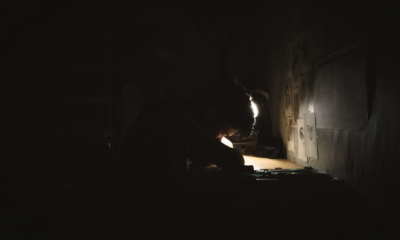Life
16 Things I’d Tell My 20 Year Old Self Today

If you’d like to learn how to elevate your mind and amplify your influence so you can live your best life, sign up for the free 90-Day Master Class hosted by the founder of Addicted2Success.com, Joel Brown.
When I was 20, I used to think that I knew everything about life. I lived with the same delusion when I became 22, and even 27. High expectations from everyone around me and self-flagellation caused me many problems. Some remain even now.
In this letter to myself, I want to speak to every 20-year-old. Don’t think that it’s just another motivational letter to myself. It’s the lessons I wish I knew ten years ago.
My Letter to 20 Year Old Self
Hello, dear! I know you would probably be skeptical about what I would say. But I hope you will listen at least to some advice from the lessons I learned through my experience..
1. You Won’t Always Get Things Done Your Way
Even though it’s hard to admit, you have to engrave this in your brain: “Things don’t always work according to your plan”. Sometimes, deviations are minor, sometimes life-changing. You must always have plan B.
2. Don’t Burn Bridges
You never know who you are going to need in the future. It might be your lecturer, the first boss, a cashier in a coffee-shop near your house. Always remember we live in a small world.
3. Choose the People You Surround Yourself with
Those surrounding you shape you. If you don’t want to act like someone from your inner circle, cross him/her out.
“Keep away from people who try to belittle your ambitions. Small people always do that, but the really great make you feel that you, too can become great.” – Mark Twain
4. Learning Is an Everlasting Process
This isn’t just to do with career advice. The more you live, the more you wish you knew more. Keep evolving.
5. Never Postpone Life
Don’t wait until you finish college or start a new job. Time is passing faster than you can imagine. If you don’t learn how to live in the moment, you will never live at all.
6. Care about Your Mind and Body
You are your most precious asset. Don’t ignore red flags. Many problems don’t disappear on their own, no matter how much we wish they did.
7. You Can Say No
You can say “no” to everything. If something provokes stress and anxiety, cut it out from your life. Even if it seems hard, you will thank yourself later.
8. Trust Your Gut
Your gut is your invisible guide through making decisions. You don’t always have to push yourself in a particular direction if it feels wrong. Advice to myself – say “No” to whatever you want to.
9. Don’t Bottle Up
You deserve to experience life in all its fullness. Emotions – even negative ones – are a part of it. In this letter to myself, I want to highlight that bad emotions aren’t always bad. Without them, we won’t feel the pleasure of good feelings.
10. Forgive
Holding grudges will hardly make your life better, and usually, the only one to suffer is you. Others won’t haul around this weight inside themselves.
11. You Are Your Greatest Ally and Opponent
You are your best support, and you are your toughest challenge. Overpowering yourself is hard. There is no need to compare your results with others. Be better than you used to be.
12. Always Stand Up
You will fall down. Unfortunately, this will happen many times. Sometimes these falls will seem fatal. And that’s normal. What you have to learn is to pull yourself together.
“When life knocks you down, try to land on your back. Because if you can look up, you can get up. Let your reason get you back up.” – Les Brown
13. Stay Passionate about What You Do
Whether you are going to open a printing shop or a café, remain passionate. Your inner power will lead to success. You are the only one who can light this flame.
14. Perceive Challenges as an Opportunity
Even a study from Kings College in London proved that positive thinking reduces worry and anxiety. As this letter to myself states, life will hit you hard. You will face many challenges. If you embrace them as an opportunity for improvement, they will be easier to overcome.
15. Acknowledge Your Freedom to Shape Your Life
You are the master of your life. Although you don’t have the power to control the circumstances, you take responsibility for your own response.
16. Develop Self-Love
This is one of the most crucial things I would say. Love yourself. This way, you won’t need anyone to give you love. This is an unchanging principle of life.
P.S. Note to myself: Even if you don’t follow any of it, you are still wonderful!
Which of the 16 things I shared resonated with you the most and why? Share it in the comments!
Did You Know
How Skilled Migrants Are Building Successful Careers After Moving Countries
Behind every successful skilled migrant career is a mix of resilience, strategy, and navigating systems built for locals.

Moving to a new country for work is exciting, but it can also be unnerving. Skilled migrants leave behind familiar systems, networks, and support to pursue better job opportunities and a better future for their families. (more…)
Life
10 Research-Backed Steps to Create Real Change This New Year
This New Year could finally be the one where you break old patterns and create real, lasting change.

Every New Year, we make plans and set goals, but often repeat old patterns. (more…)
Life
9 Harsh Truths Every Young Man Must Face to Succeed in the Modern World
Before chasing success, every young man needs to face these 9 brutal realities shaping masculinity in the modern world.

Many young men today quietly battle depression, loneliness, and a sense of confusion about who they’re meant to be.
Some blame the lack of deep friendships or romantic relationships. Others feel lost in a digital world that often labels traditional masculinity as “toxic.”
But the truth is this: becoming a man in the modern age takes more than just surviving. It takes resilience, direction, and a willingness to grow even when no one’s watching.
Success doesn’t arrive by accident or luck. It’s built on discipline, sacrifice, and consistency.
Here are 9 harsh truths every young man should know if he wants to thrive, not just survive, in the digital age.
1. Never Use Your Illness as an Excuse
As Dr. Jordan B. Peterson often says, successful people don’t complain; they act.
Your illness, hardship, or struggle shouldn’t define your limits; it should define your motivation. Rest when you must, but always get back up and keep building your dreams. Motivation doesn’t appear magically. It comes after you take action.
Here are five key lessons I’ve learned from Dr. Peterson:
-
Learn to write clearly; clarity of thought makes you dangerous.
-
Read quality literature in your free time.
-
Nurture a strong relationship with your family.
-
Share your ideas publicly; your voice matters.
-
Become a “monster”, powerful, but disciplined enough to control it.
The best leaders and thinkers are grounded. They welcome criticism, adapt quickly, and keep moving forward no matter what.
2. You Can’t Please Everyone And That’s Okay
You don’t need a crowd of people to feel fulfilled. You need a few friends who genuinely accept you for who you are.
If your circle doesn’t bring out your best, it’s okay to walk away. Solitude can be a powerful teacher. It gives you space to understand what you truly want from life. Remember, successful men aren’t people-pleasers; they’re purpose-driven.
3. You Can Control the Process, Not the Outcome
Especially in creative work, writing, business, or content creation, you control effort, not results.
You might publish two articles a day, but you can’t dictate which one will go viral. Focus on mastery, not metrics. Many great writers toiled for years in obscurity before anyone noticed them. Rejection, criticism, and indifference are all part of the path.
The best creators focus on storytelling, not applause.
4. Rejection Is Never Personal
Rejection doesn’t mean you’re unworthy. It simply means your offer, idea, or timing didn’t align.
Every successful person has faced rejection repeatedly. What separates them is persistence and perspective. They see rejection as feedback, not failure. The faster you learn that truth, the faster you’ll grow.
5. Women Value Comfort and Security
Understanding women requires maturity and empathy.
Through books, lectures, and personal growth, I’ve learned that most women desire a man who is grounded, intelligent, confident, emotionally stable, and consistent. Some want humor, others intellect, but nearly all want to feel safe and supported.
Instead of chasing attention, work on self-improvement. Build competence and confidence, and the rest will follow naturally.
6. There’s No Such Thing as Failure, Only Lessons
A powerful lesson from Neuro-Linguistic Programming: failure only exists when you stop trying.
Every mistake brings data. Every setback builds wisdom. The most successful men aren’t fearless. They’ve simply learned to act despite fear.
Be proud of your scars. They’re proof you were brave enough to try.
7. Public Speaking Is an Art Form
Public speaking is one of the most valuable and underrated skills a man can master.
It’s not about perfection; it’s about connection. The best speakers tell stories, inspire confidence, and make people feel seen. They research deeply, speak honestly, and practice relentlessly.
If you can speak well, you can lead, sell, teach, and inspire. Start small, practice at work, in class, or even in front of a mirror, and watch your confidence skyrocket.
8. Teaching Is Leadership in Disguise
Great teachers are not just knowledgeable. They’re brave, compassionate, and disciplined.
Teaching forces you to articulate what you know, and in doing so, you master it at a deeper level. Whether you’re mentoring a peer, leading a team, or sharing insights online, teaching refines your purpose.
Lifelong learners become lifelong leaders.
9. Study Human Nature to Achieve Your Dreams
One of the toughest lessons to accept: most people are self-interested.
That’s not cynicism, it’s human nature. Understanding this helps you navigate relationships, business, and communication more effectively.
Everyone has a darker side, but successful people learn to channel theirs productively into discipline, creativity, and drive.
Psychology isn’t just theory; it’s a toolkit. Learn how people think, act, and decide, and you’ll know how to lead them, influence them, and even understand yourself better.
Final Thoughts
The digital age offers endless opportunities, but only to those who are willing to take responsibility, confront discomfort, and keep improving.
Becoming a man today means embracing the hard truths most avoid.
Because at the end of the day, success isn’t about luck. It’s about who you become when life tests you the most.
Change Your Mindset
The Four Types of Happiness: Which One Are You Living In?
Most people chase success only to find emptiness, this model reveals why true happiness lies somewhere else.

In a world driven by rapid technological growth and constant competition, many people unknowingly trade joy for achievement. (more…)
-

 News3 weeks ago
News3 weeks agoBrandon Willington Builds 7-Figure Business by Ignoring Almost Everything
-

 Health & Fitness4 weeks ago
Health & Fitness4 weeks agoWhat Minimalism Actually Means for Your Wellness Choices
-

 Did You Know3 weeks ago
Did You Know3 weeks agoWhy Most Online Courses Fail and How to Fix Them
-

 Business4 weeks ago
Business4 weeks agoIf Your Business Internet Keeps Letting You Down, Read This
-

 Business2 weeks ago
Business2 weeks agoEntrepreneur’s Guide to Pay Stubs: Why Freelancers and Small Business Owners Need a Smart Generator
-

 Business2 weeks ago
Business2 weeks agoThe Salary Shift Giving UK Employers An Unexpected Edge
-

 Business2 weeks ago
Business2 weeks agoThe Simple Security Stack Every Online Business Needs
-

 Scale Your Business2 weeks ago
Scale Your Business2 weeks ago5 Real Ways to Grow Your User Base Fast





























